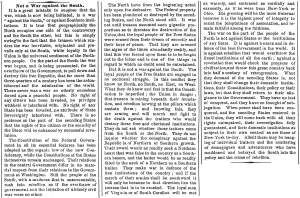Record Data
Transcription
Not a War against the South.
It is a great mistake to suppose that the war, which is now being initiated, is a war “against the South,” or against Southern institutions. It is true that geographically the North occupies one side of the controversy and the South the other, but this is simply owing to the fact that the treason which renders the war inevitable, originated and prevails only at the South, while loyalty to the Union is the universal sentiment of the Northern people. On the part of the South the war was begun, and is being prosecuted, for the overthrow of the Government, to pull down and destroy this free Republic, that for more than three-quarters of a century has been the astonishment and the admiration of the world. There never was a war so utterly causeless forced upon a peaceful people. No right of any citizen has been invaded, no privileges withheld or interfered with. No right of any State has been invaded, no attribute of State Sovereignty interfered with. There is no pretence on the part of the seceding States that the rights of the citizen or the security of the State will be enhanced by successful revolution.
The Constitution of the Federal Government in all its essential features has been adopted as the organic law of the new Confederacy, while the Constitutions of the States themselves remain unchanged. Their relations to the central Government differ in no material respect from their relations to the Government at Washington. Still the people of the South, with a madness that is unaccountable, rush into rebellion as if the overthrow of government and the initiation of a bloody civil war were no crime.
The North have from the beginning acted only upon the defensive. The Federal property has been plundered or destroyed by the seceding States, and the North stood still. It was not until treason assumed such gigantic proportions as to threaten the destruction of the Union, that the loyal people of the Free States were roused from their dream of security and their hope of peace. That they are aroused the signs of the times abundantly testify, and that this war forced upon them is to be fought out to the bitter end is one of the things in regard to which no doubt need be entertained.
But it is not a war against the South. The loyal people of the Free States are engaged in no sectional struggle. In this conflict they know no North, no South, no East, no West. What they do know and feel is that the Constitution is imperiled; the Union in danger ; that treason is mining beneath their foundation, and rebellion hewing at the pillars which sustain them; and knowing this, they are arming and will march and fight to the death against the traitors who would destroy these free and cherished institutions. They do not ask whether these traitors come from the South or the North. They do not inquire whether the conspiracy against the Republic is of Northern or Southern growth. Their sword would as readily seek a Northern heart that was false to the country as a Southern bosom, and the halter would be as readily fitted to the neck of a Northern as a Southern traitor. They make war in defene of the free institutions of the country; and if the march of their armies shall be southward it will only be because in that direction lies the treason that is to be crushed. The loyal man of Virginia or of South Carolina will be met as warmly, and embraced as cordially and earnestly, as if he were from New York or Ohio. His greeting will be the more fraternal because it is the highest proof of integrity to resist the temptations of association, and remain faithful among the faithless.
The war on the part of the people of the North is not against States or the institutions of any State. It is against treason and in defence of the best Government in the world. It is against rebellion that would overthrow the freest institutions of all the earth; against a revolution that would check the progress of civilization, and throw this great country back into half a century of retrogression. What they demand of the seceding States is, not that they shall change their domestic institutions, their Constitutions, their policy or their laws, but that they shall return to their allegiance to the Government. They have no lust of conquest, and they have no thought of subjugation. When peace shall have been conquered, and the seceding States restored to the Union, they will come back with all their rights unimpaired, their sovereignties fully guaranteed, and their domestic institutions as subject to their own control as are those of New York to-day. Albeit there may be hanging of individual traitors and the scattering of demagogues and adventurers who have maddened and betrayed the South into the policy and the crime of rebellion.


